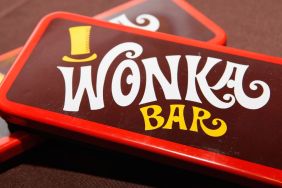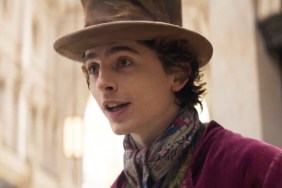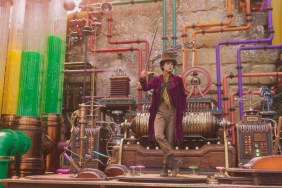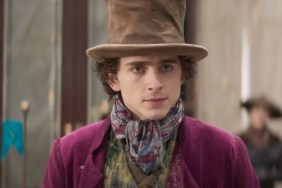Johnny Depp as Willy Wonka
Freddie Highmore as Charlie Bucket
David Kelly as Grandpa Joe
Helena Bonham Carter as Mrs. Bucket
Noah Taylor as Mr. Bucket
Missi Pyle as Mrs. Beauregarde
James Fox as Mr. Salt
Deep Roy as Oompa Loompa
Christopher Lee as Dr. Wonka
Adam Godley as Mr. Teavee
Franziska Troegner as Mrs. Gloop
Annasophia Robb as Violet Beauregarde
Julia Winter as Veruca Salt
Jordon Fry as Mike Teavee
Philip Wiegratz as Augustus Gloop
Liz Smith as Grandma Georgina
Eileen Essell as Grandma Josephine
Summary:
Tim Burton’s magical version of Roald Dahl’s classic is as weird and twisted as you might expect, but it still far surpasses the original movie in every sense.
Story:
Willy Wonka (Depp), the eccentric recluse whose factory churns out the world’s most popular chocolates and candy, is holding a contest. Five lucky kids who find a Golden Ticket hidden in his chocolate bars will get to tour Wonka’s fantastic factory, with one lucky winner getting an even bigger prize. For Charlie Bucket (Freddie Highmore), the poorest boy in town, it’s a chance for him to get his family out of their impoverished lifestyle, and it’s a day that he and his Grandpa Joe (David Kelly) will not soon forget.
Analysis:
Forty years after Roald Dahl’s classic children’s novel first appeared on shelves, it’s been readapted by a director whose singularly unique vision has found him many fans among those who enjoy the weird and the wonderful. Less than ten minutes into Charlie and the Chocolate Factory, and it becomes quite evident that Tim Burton is much better suited for this movie than he was Planet of the Apes.
It’s assumed that most people know the general story of Charlie, a poor boy who by sheer luck achieves his dream of visiting the local chocolate factory along with a group of poorly behaved kids. There’s the ultra-competitive Violet Beauregard, the gluttonous Augustus Gloop, greed personified in the form of Veruca Salt, and Mike Teevee, a nightmare of a boy whose driven his father prematurely bald, and of course, each of them will meet an appropriately bad end while taking the tour.
For all the talk of this not being a direct remake of the 1971 movie starring Gene Wilder as Willy Wonka, it really isn’t that different in concept or plot. How this version immediately stands out is that it looks absolutely amazing compared to the relatively low-fi original. Much of this can be attributed to the evolution of filmmaking and effects, as well as the bigger budget, but nonetheless, the work put into the look of the film from the conveyor belt title sequence to the first look at the factory exterior and all of the colorful rooms inside makes this film as wondrous a visual experience as some of Burton’s previous films. Thirty years of technology also let Burton bring back the Nut Sorting Room from Dahl’s book, complete with hundreds of squirrels, and that alone, makes this worth the price of suffering another “remake.”
There’s little doubt that the movie belongs to Johnny Depp and Freddie Highmore, who are able to recreate their chemistry from Finding Neverland that made that film so special. Depp’s Wonka is far less cuddly than that of Gene Wilder, playing it more like a demented Mr. Rogers with more than a bit of a sadistic streak. The way that he watches the kids meet their fates with giddy glee is quite disturbing, but it’s hard not to enjoy this quirky hermit’s complete lack of social skills.
Of all the things Burton brings to the table, the most notable additions are the periodic flashbacks to Wonka’s past, which are used to explain his weirdness. Like a certain pop star to whom Wonka has been compared, he has some deep-seated father issues, so when you watch him as a brace-faced child dealing with a dentist father, played by Christopher Lee no less, who won’t let him eat candy, it’s not particularly surprising when he turns out the way he does. The perfect casting of Lee as another nod by Burton to the horror movies of his youth, but it works as well as having Vincent Price play the “father” to Depp’s Edward Scissorhands.
By comparison, Highmore’s Charlie is such a sweet and perfect angel that you just want to give him a big hug because he always looks so sad, despite remaining very optimistic for someone living such an impoverished lifestyle. The other young actors do such a great job being awful that it makes Charlie look even better. The other kids seem to reflect the more cynical and worldly nature of kids today while Charlie retains the same child-like wonder that Wonka still has. This role reversal is the primary drive of Wonka’s patter to the kids, pretty much voicing what we’re thinking, and it allows for the type of sharp and humor at which Burton excels. Many of the “Burtonesque” sight gags are so perfectly aligned with Dahl’s own quirky sense of humor that it gets harder to remember what was in the original book and what is Burton’s own creation. Although a lot of the humor works because of the subtlety of the delivery, some bits are a bit too over-the-top like the exuberance of David Kelly’s Grandpa Joe at learning that he’ll be visiting Wonka’s factory with Charlie.
The decision to use one person, in this case British actor Deep Roy, to play all the Oompa Loompas seems odd at first, but it allows for some entertaining moments, as he goes through numerous costume changes from factory worker to barber to Wonka’s much-needed shrink. Of course, the Oompas’ biggest contribution to the movie is to act as the Greek chorus with their extravagant musical numbers, and unfortunately, these are also the movie’s weak point. It’s great seeing Danny Elfman return to his Oingo Boingo roots providing his own voice for the eccentric musical numbers, but the productions get more annoying and silly as they go along. The tribute to MGM musicals is a lot of fun, as is the Byrds influenced homage to Veruca Salt, but the Mike Teevee television montage wasn’t nearly as good.
After the rotten kids are systematically dispersed, Burton wraps the story up with the type of feel-good ending that should easily win over even the most cynical and jaded of viewer. Sure, it takes the focus away from Charlie, but it’s a far better ending than the original movie, and it’s just part of what makes this movie one that is sure to get more enjoyable with repeat viewings.
The Bottom Line:
Some may find Burton’s latest film to be too wacky and even snide, but others should be able to experience this magical ride that lets you be a kid again without giving up all the cynicism inherent with being an adult. It probably won’t leave you pondering the meaning of life as you leave the theatre, but for two hours, it will let you escape the real world and experience something magical unlike anything you’ve ever seen before.










